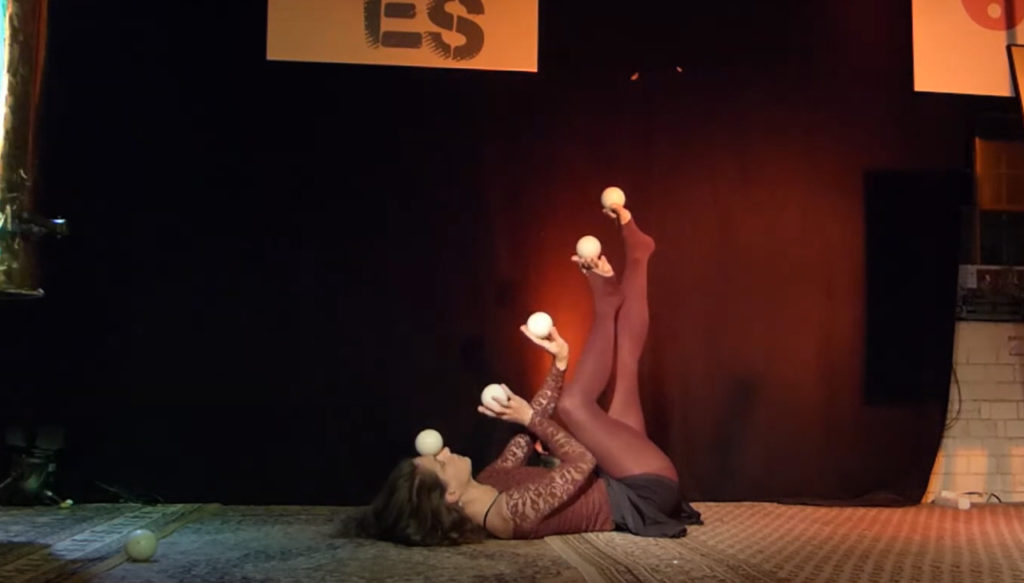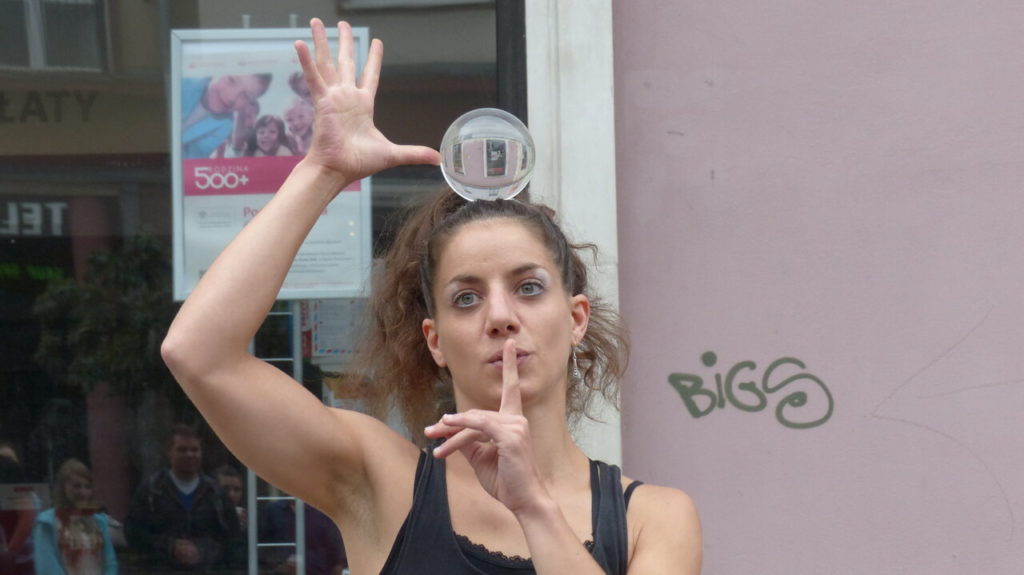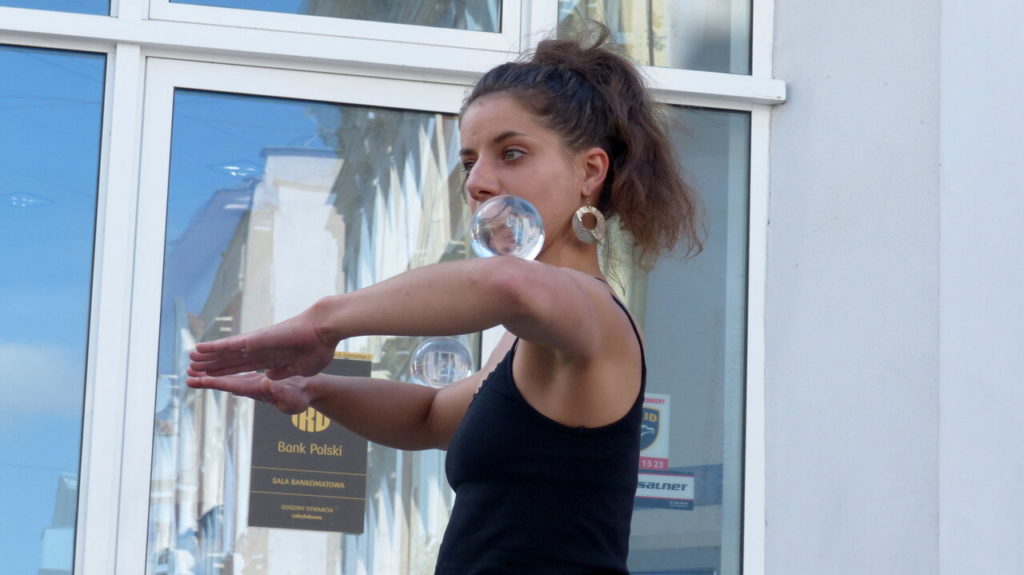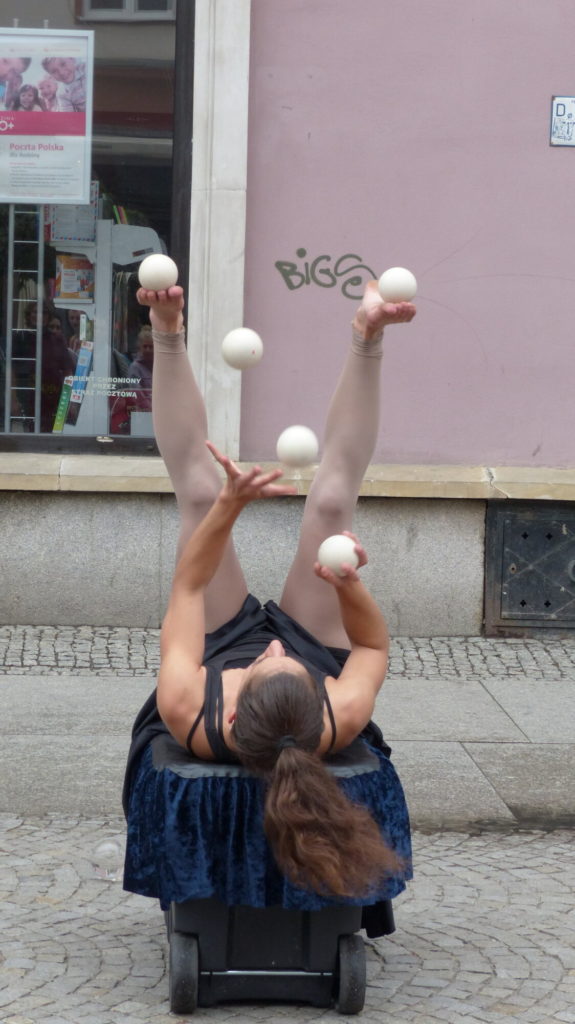
Choreographer, director and performer Ariane Oechsner (better known as ariane) about combining performative art and activism, her list of female jugglers and what is important in life.
With that little power I have as an artist, I also have a great responsibility. My ability to touch people also implies an obligation to change the world for the better – however hard it is to know what “better” actually means.
My anger about injustices fuels me. I can only work when I care; the work is often tedious and underpaid. Strong emotions give me the energy to do that work.
ariane
Hi Ariane, how are you? I know that 2020 was an exciting and productive year for you. What you have been up to, and what are your plans?
Thank you for asking. I am doing well – I have a lot to do, but only things I enjoy doing.
2020 was a challenging year and also really good for me. I had been touring with different shows for the last few years and had had a massive burn out (panic attacks, physical pain, memory loss, depression). Touring took its toll on my health. So when in 2020 everything was cancelled, I was – despite all the stress that came from rescheduling and the fear for the lives of my loved ones – also a little happy.
At first, I rested. Being able to rest made it possible for me to realise what is important in life.
I felt very lucky to be (in the first lockdown) in an ok financial situation and living in a secure country in a beautiful house with lovely people: so I wanted to do something for people who are not so lucky.
I started teaching online classes for donations for NGOs helping refugees in the Mediterranean sea. It was a great past time for me and taught me how to teach online: now that I am in dire need of money, I can use that experience: I can take on paying students and am able to give them good lessons worth their money.
Of course, at first, I was also lost and scared in this new situation like everyone else. After a while, though, I started listening to and reading texts of philosophers talking about what could come of the pandemic if we used it well. Following their thoughts, I focussed more on intimate friendships, family, and direct surroundings.
It was the first time in ages I saw how the seasons change in one place as I stayed in one place to see it instead of hopping onto a plane to play the next festival.
ariane
Direct surroundings also means working more locally- something I had put no attention towards in my touring life. Locally for me means Vienna, where circus is still underrepresented as an art form. The amazing Joanna Bassi (one of the smartest people I ever met) gave me the idea to – instead of travelling to where work conditions are alright – reshaping my surroundings to make good working conditions for myself and others. So I put my time into further setting up our circus training space in Vienna (TRAP). I also did political work to strengthen the Austrian circus scene, applied for local arts funding and managed to secure some of it (so I can realise some cool artsy and political projects in 2021).
It is a lot of work and I did not do it on my own. So many amazing people, friends and colleagues that I trust and respect helped me. There is so much potential in the people close to me – spending more time with them made me see that, and together we started great projects.
I also realised we could use this time for education, at least if we are privileged enough to have access and financial security. I applied for a postgraduate course at a circus school in France about formalising your projects. So, here I am at the moment, in Toulouse, learning tools to kick ass in the future better.
Now I want to continue on this path: use my ok situation to help others, strengthen my surroundings to be able to work well inside them, use the potential that was there all along and learn better how to realise my own projects in this crazy, ever-changing world.
“I did not fit any of the classical characters”
What is your background? Have you always wanted to be a performing artist?
Both of my parents work in the arts: my mother is a dance teacher, and my father is a jazz musician. I grew up in backstages and studios. I started early with training in several art forms. Then there was a long time (my crazy teenage years) where I wanted to get as far away from it as possible and went into natural science: as far as studying applied physics at university. Coming from a poor background, though, I never had enough time and energy (besides keeping up three badly paid jobs) to study enough for that super challenging subject. After completing exhaustion and failing two exams, I sat down and wondered about what I want my life to look like in the future. I realised that I would not want to spend my life working in some laboratory and feed computers with information despite being in love with mathematical formulas. It just wasn’t worth the hardship I went through in order to study.
I quit my studies, took up dance training again, worked in small theatre productions and auditioned for acting schools. 13 auditions and I was never taken.
The feedback was that I did not fit any of the classical characters (the boring female trinity: virgin, mother or crone), so I am no use for theatre productions despite being good on stage.
ariane
By chance, I auditioned for a small circus school in Berlin (I had taken up juggling as a hobby a few years before). They took me. I never thought I would be a juggler – and here I am.
Women can juggle
You made a list of female jugglers when you realised that people think that only men can juggle. There are over 300 women on your list. Did you expect to get so many results? What was the feedback you got from people?
I started that list because of being angry. Really, really angry for being repeatedly told and suggested that women cannot juggle, and there are no juggling women. I knew that list would be long—a very long. What I did not expect was the reactions: the gratefulness I received from so many female jugglers. I got a stream of messages thanking me for showing the world that they existed and for making them realise that they are not alone from older women jugglers.
The younger generation wrote to me about how happy they are to see so many role models they can actually identify with. That made me so happy. Both generations wrote to me with stories about how they had been disrespected and mistreated: explained over and over that they genuinely cannot juggle, that they are not as good as their male colleagues – some of them wrote about having had thoughts of giving up because of that. Crazy sad.
Men wrote to me thanking me for drawing their attention towards the subject – most of them had not realised how bad it was, how underrepresented women were in the scene despite being so numerous. It was all pretty emotional for me – in positive and negative ways. It mostly made me realise how much work there still is to do, and I am super thankful that the initiative of making the list made me connect with people who are willing to do the work.

On Reddit where someone posted info about your list, one of the users asked about its purpose and if there is sexism in juggling. Do you have a feeling that your skills are underestimated because you are a woman?
The thing is: I get both.
I get over-appreciation for skill because I am a woman (which is just as bad), and I get underestimated and underrepresented.
ariane
I lacked role models I could identify with, I was told that juggling is not for me, I got/get sexually harassed in my working environment, and I was told that I only got the job because I am a pretty girl. If anything, I am a pretty WOMAN, thank you very much, and my looks are not for you to comment on! All of these led to severe confidence problems and got me close to giving up several times.
The intersection of performative art and political activism
For the last two years, you have worked on dis.cover where you question the audience’s perception of a female body and personality. How is it going, and what are the conclusions so far?
dis.cover is a piece that does not use any text. My research is purely on a physical and experiential level and thus hard to put into words. I will share a little part of the concept here, though, hoping it answers the question:
“An arm hidden under layers of cloth cannot juggle. I feel self-conscious and cannot move freely when naked. Fabric highlights certain movements – makes them appear more expansive, it also covers and hides objects, or my body. I interpret these qualities and restrictions as symbols of femininity as a social construct, which lead me to experiment with wearing the skirts in different ways. The varying clothing not only changes my quality of movement, it also changes the perception of my personality by my audience.
The balls serve to highlight body parts and help to “unsexualise” them: the peculiar abilities of one foot when manipulating a ball, the increased attention an audience directs at an elbow when it moves to balance, the folds of skin and fat on a belly when it bends over to snatch flying objects out of the air, the deformation of a muscular back when struggling in concentration for a difficult trick… create an aesthetic beyond sexual attraction or rejection.”
Artists can touch people emotionally and explain complicated topics in a way that is easy to understand. Do you believe that performers should more often raise awareness of important issues?
I don’t know what to think about what other artists should do. I only know what I should do, and for me, the answer is “yes”.
With that little power I have as an artist, I also have a great responsibility. My ability to touch people also implies an obligation to change the world for the better – however, it is hard to know what “better” actually means. My anger about injustices fuels me. I can only work when I care; the work is often tedious and underpaid. Strong emotions give me the energy to do that work.
All this is true for me – it might be different for someone else.
One-third of the women on your list comes from three countries: Argentina, France and Mexico. What countries come to your mind when you think of juggling, and what makes it more popular in some places over the others?
I have little knowledge about why juggling is so well represented in Latin-America; I just know that it is, so it is only natural that women are interested in it as well. In France, circus is recognised as an art form; it is well represented in public, there are many professional schools. This leads to more people, so also more women, practising these arts. Germany is also known for having many jugglers – partially because of some individuals who worked hard to spread it across the country, so we can find many female jugglers there.
You have been working in various countries. What are the differences in the approach towards contemporary circus in recognising it as a profession, offering funds and, in general, understanding the importance of art?
Every country has its own approach towards arts in general and circus-related arts in particular. This obviously heavily influences the artist’s approach to what is made, but the situation and history are so diverse that there are not many things I would dare to generalise.
Maybe one can say that the more funding is in place, the more recognised importance art/circus has, the more experimental and daring the scene is.
In France, where funding and structures are well established and accessible, a lot of very experimental, wild ideas can grow. In Germany, where circus has basically no funding, most artists focus more on their shows that sell well, so more easy-going mainstream shows are produced.
Generally, if there is more money (it doesn’t matter if it is from selling the show or from funding), the quality is higher: the skills are more impressive or difficult and the shows are more carefully produced. Simply because if you earn well with it, you can spend more time and effort to make something. I would wish for arts to exist outside of this capitalist logic.

Do you notice any difference in people’s perception of the new circus over the years?
I think that circus-related art forms and disciplines, in general, have quite a revival at the moment. You can see more acrobats, jugglers, etc. In mainstream media again, festivals are popping up all over Europe, circus schools becoming more professional, some even elevated to university level. This changes people’s recognition.
When I started, people would constantly ask me what my “real job” is (besides having fun with the circus – which obviously cannot be a job). Now I get this reaction a lot more seldom. People show more positive interest, still often unbelieving that I can actually make a living this way, but at least they do not act anymore like I was lying.
The many festivals and more theatres booking contemporary circus-shows also slowly increases people’s understanding that this is more than people with red noses falling over their own feet.
ariane
Of course still very dependent on the people’s background, but I think in Europe, there is a noticeable shift in people’s understanding of acrobatic feats as an art form.
What is your creative process? How do you balance the artistry, storytelling and technical skills?
I used to concentrate most of my time and energy on technical skill; these days, I only use it to show off on Instagram. For my stage work, I focus mostly on the artistic side of things; not so much in a storytelling way – my work has become quite abstract over the years.
The technical feats I use for my pieces are only in place if they serve it in a coherent conceptual and/or dramaturgical way.
ariane
I still train a lot, though, as I enjoy it. A typical working day in the studio is about half – technical training and a half – artsy stuff. However, the artsy stuff (the thinking and conceptualising and re-thinking and re-searching) often continues outside the studio. At the same time, my technical skill does not bother me in sleepless nights anymore.
How to get started with juggling? What are your tips for absolute beginners?
Just do it. There are endless different ways to become a juggler. Some like working with teachers, others more on their own. Some become professionals. Others treat it as a hobby. Some get into one style, others into another one. If you like it and invest time, it will happen. The best tips I can give are: breathe, be patient, relax the shoulders and always stay soft in the knees. And don’t let anyone tell you that it isn’t for you because of your gender, skin colour, social background, ability or disability or any other reason. Enjoy.
What has been the most memorable moment in your artistic life?
There are many: good and bad ones. One of my earliest favourites was a small girl in the audience pointing at me and telling her mom: “I want to be like her”. Another one ends with me breaking my nose on stage; it was 100 per cent my fault as I smashed my face onto a wooden table. Then there is one about a musician being so drunk that he falls over during the show and the other band members having to catch him and put him back straight. And another one… a million other ones. I cherish every single one of them!
What is your busking experience? Do you remember your first street show?
I do remember my first street show. It was horrible. I earned 20 cents and a few mean comments. After I went home crying.
Then I was lucky to play for a long time with friends who had much more experience than me. This way I could learn from them and together it was easier in general. I learned to be confident and what to do to make people stop. In the end, I performed in complete silence and was still able to catch and hold the people’s attention.
I haven’t been busking in years, though. I sometimes miss it. The proximity to the audience – the momentariness. There is something very special in transforming something as ugly as a shopping street into something as magical as a showplace. I also have crazy respect for people who do it well, and for a long, I found it very strenuous after a few years, especially the insecurity. You never know if it will be a good day or a bad one, you are dependent on the weather and so many other factors. Festivals and theatres are a bit easier – you have a contract and a nice hotel room or apartment, everything is organised for you. I like that too; it makes it easier.

What shows make you stop on the street? Do you have your favourite street performers?
I can easily say that I love all the street shows. There are so many different ones to be loved for different reasons. Sure I am happy if someone shows something I have never seen before. I also appreciate a classical circle show with all the usual jokes if delivered well. A well designed and presented statue can impress me as much as someone on a unicycle on a tight-wire.
I like it when street performers use the special possibilities and rules their genre has; if they know how and where to place the show, in which surroundings. If they pay attention to the rhythm of the punters, know how to work a crowd, are quick to react to unforeseen events etc.
I do not have favourites, but many that I love for their work and as friends – those are special.
Making the audience feel loved
What makes a performer a good performer?
Again, I think there are endless different ways to endless different facets of success. So many good performers, all of them good for various reasons.
Generosity towards your audience, for sure, is a good asset – letting them feel how much you love them. It also helps if you are not scared of being ugly or making a fool of yourself (the audience loves it when you make a fool of yourself!). I think it helps tremendously to like oneself, and it makes it easier for others (the audience) to like you.
ariane
But then, there are so many examples for which none of this is true, and they are still great performers.
If you found a goldfish that granted you three wishes, what would you wish for?
World peace, the end of the patriarchy, and for the poor goldfish to have an easier life than making my wishes come true.
About ariane
Ariane was born in Germany and grew up in Austria. Originally she studied applied physics at the TU (Vienna), as well as theatre, film and media studies at the University of Vienna. In 2013 she graduated from the professional circus school DIE ETAGE e.V. in Berlin and went on to do her master’s in choreography at the Codarts in Rotterdam and Fontys in Tilburg (Joint-Degree COMMA – Co-Creation of Movement Master of Arts). At the moment, she follows the course “Formalisation de Projet” at ESACTO’Lido in Toulouse. She has worked as a janitor, chef, waitress, mathematics teacher, designer, festival organiser, problem solver, nanny in a call centre, a porcelain shop – she performed in theatres, circuses and the streets.
After several years living somewhere between Berlin and Paris, early in 2020, Ariane returned to Vienna, where she engages as an active member in several local art collectives (TRAP, SchloR, Töchter der Kunst etc.).
For the past nine years, Ariane successfully toured the world (Europe, Asia, Africa, USA, South America) in various artistic contexts (Cirque Romanès, CriticalMess by Stefan Sing, Jérôme Thomas, etc.). Recently she focused on writing and realising her own projects (notably: “play nice” with Roxana Küwen).
Ariane works as a choreographer, director and performer – focused on the non-verbal, aesthetic expression of movement and object manipulation. She understands her artistic practice as inter- (sectional) disciplinary: her current research interest explores the intersection of performative art and political activism.
